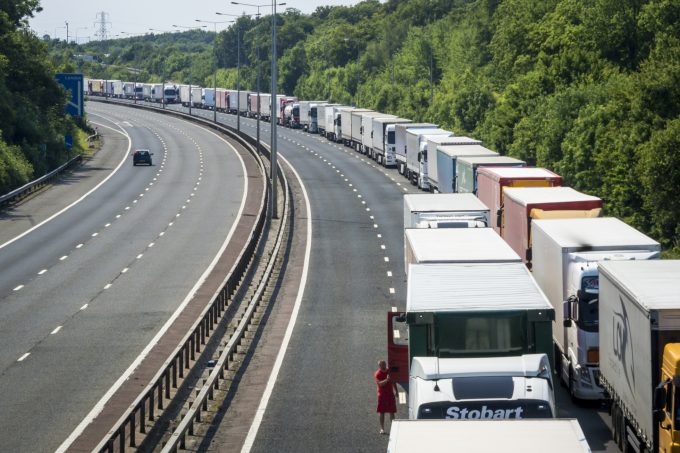UK to again delay start of checks on EU imports
Surprise, surprise: the UK government has decided yet again to delay import checks, it has ...

Planning is underway to tackle expected chaos on UK highways in the event of a no-deal Brexit, with roads leading to the Port of Dover in Kent expected to bear the brunt of it.
Deputy chief executive of the Freight Transport Association (FTA) James Hookham said he expects the backlogs from shipments coming through Calais to face extreme delays.
“From what I am hearing, in the event of no deal, French customs is planning to deploy aggressive enforcement of border checks at Calais,” he said.
“Should this reality play out, I expect to see the roads jam up, which will inevitably lead to the collapse of services.”
Policy and public affairs manager at the FTA, Heidi Skinner, said the government intends to prevent a standstill on Kent’s roads, and in the event of no deal will initiate Operation Brock.
This will see the coast-bound lanes of the M20 at junctions 8 and 9 reserved for HGV traffic, with the middle lane kept clear for emergency vehicles.
“These trucks will then be placed in a slow-moving system, which at no point will be brought to a complete standstill,” said Ms Skinner.
“This could mean trucks moving as slow as 30mph, but the government has expressed that the most important thing is to keep the traffic moving.”
The main roads between London and Dover will be turned into a four-lane contraflow system – recommissioning the hard shoulder as the fourth lane – two coast-bound and two London-bound.
These lanes will be reserved for all non-freight traffic and any freight traffic that is not destined for the Port of Dover.
“Operation Brock will take effect in March if it appears it will be a no deal as it will take two weeks to install the permanent barriers on the contraflow,” Ms Skinner told The Loadstar.
“While non-Dover-bound HGVs will be allowed to use the contraflow, if drivers use it to avoid speed restrictions on coast-bound lanes, they will be forced off and sent back.”
It is also understood that under the proposed traffic management system, Dover-bound HGVs will be forced off the M20 at the junction 7 and onto the A249.
From there they will be sent to Manston, where they will be held to ease the congestion, with an existing facility there capable of holding up to 4,000 trucks.
Head of skills at the FTA, Sally Gibson, said that this could create regulatory issues, with drivers only permitted to be on the road for a certain number of hours a day.
“The trip up to Manston, alongside the slow-moving duration along the M20, will inevitably add to the number of hours drivers are active,” she said.
“This could see them go over the legislated number of hours they are permitted to be active and may require those rules to be reconsidered.”
Ms Skinner said the government had yet to make any announcement on whether there would be any flexibility in drivers’ allotted hours.
However, she noted that delays caused by snow earlier in the year had seen the government relax restrictions on driver hours.
Comment on this article